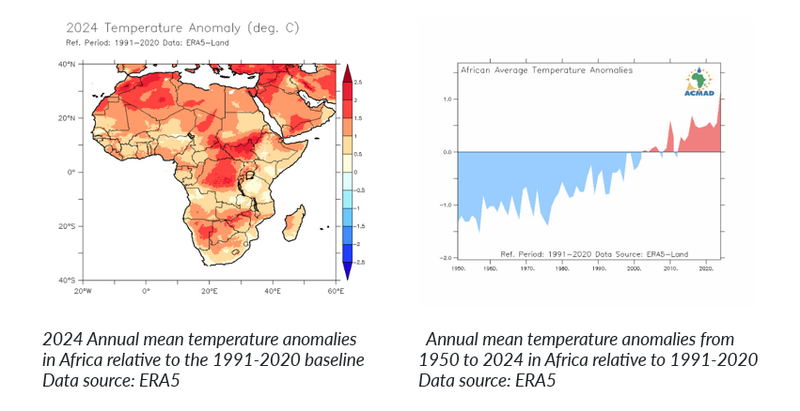Global Warming in Africa at a Glance!
In 2024, the world reached an alarming milestone. According to Copernicus report, in 2024, anthropogenic greenhouse gas concentrations hit their highest levels on record, contributing to the hottest year ever recorded for global surface temperatures. furthermore, 2024 became the first year in which the annual global average temperature exceeded 1.5°C above pre-industrial levels, surpassing the Paris Agreement target.

What Does This Mean for Africa?
The analysis of historical climate data from ERA5-Land confirms that 2024 is likely to be the hottest year on record for Africa, when compared to the 1991–2020 reference period. Since the 2000, temperature anomalies have become increasingly pronounced, signaling a rapidly accelerating warming trend across the continent. In 2024, region like North Africa has recorded extreme heat events, with temperature anomalies exceeding +2°C in some areas, accompanied by frequent and intense heatwaves. This situation aggravated water scarcity in many parts of the region, threatening conditions of life of thousands of inhabitants. In central Africa the warming is also alarming, with anomalies surpassing +1.5°C and at times over +2°C in certain locations. Southern Africa recorded anomalies in some region exceeding 1.5°C which has intensified the severe drought observed this year in the region.

Why This Matters?
Africa is one of the continent’s most vulnerable to the impacts of climate change, and the rapid rise in temperatures is already having profound consequences:
- Food Security: Prolonged droughts and unpredictable rainfall patterns threaten agricultural production, undermining the food security of millions of people.
- Water Resources: Changes in climate are disrupting water availability, with reduced rainfall in some regions and dwindling freshwater supplies.
- Public Health: Increased temperatures foster the spread of diseases and heighten the risk of health crises across the continent.
The consequences of global warming are being felt across Africa and worldwide. The urgency to act is clear, as these impacts continue to disrupt lives, economies, and ecosystems.
